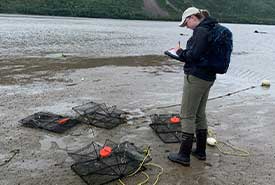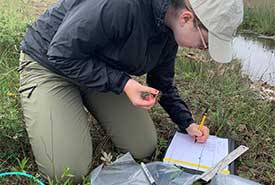A summer of partnership and experience

Julia Ball in the field,NL (Photo by Byron Bennett/QFN)
Internships with the Nature Conservancy of Canada (NCC) are never dull, but this year, one intern’s experience has been extra unique. Julia Ball is a conservation intern with NCC. At the same time, she is also an environment and natural resources intern with Qalipu First Nation (QFN).
Established in 2011, Qalipu (pronounced “holly-boo”) First Nation has a primary goal of achieving the advancement of the Mi’kmaq people in a variety of life sectors. The organization is situated in Corner Brook, Newfoundland, with satellite offices spread across the island. Some of their programs and services include education and training, tourism, culture and heritage, economic development, and environment and natural resources.
QFN’s Environment and Natural Resources department has often teamed up with NCC’s Newfoundland and Labrador team. Jennifer Sullivan, NCC’s NL stewardship coordinator, explains that their collaboration has been incredibly helpful to both organizations. “Working in a province like Newfoundland and Labrador, where the conservation community is quite tight knit and small, you really want to lift each other up and support each other where you can,” she says.
Much of the relationship between NCC and QFN has involved sharing information. Recently, NCC reached out to QFN for advice on the best way to monitor bats. QFN also stewards two of NCC’s nature reserves on the west coast of the island. With NCC’s office in St. John’s, it can be difficult for the team to travel to these nature reserves, and so QFN’s stewardship is essential.
It was this same physical distance that sparked the idea for a shared intern. NCC’s interns in the province have so far all worked from St. John’s, but this year, the team thought it might be beneficial to have one situated closer to the nature reserves on the west coast. The only issue was that this intern would be too far from the rest of the team to participate in field work regularly. Luckily, they had a potential solution.
“We knew that Qalipu also had a lot of field work that they need to get done throughout their field season, and that they might appreciate the extra support,” Jennifer says. With QFN’s enthusiastic agreement, Julia Ball was then brought in as the first ever shared intern between the organizations.
Julia is a recent graduate of Memorial University of Newfoundland, having just completed a bachelor of science degree in biology. She has a great interest in conservation biology, brought on by her love of the outdoors and desire to protect the habitats and ecosystems around her. She is thrilled that this internship, made possible by the generous support of funder Cenovus Energy, has allowed her to combine her passion for nature with her interest in learning from Indigenous knowledge.
Julia lives in Corner Brook and has spent much of the summer in the field with QFN. The organization’s approach to conservation involves the close study of a handful of specific species. The populations of species at risk, like piping plover, American eel and banded killifish, need to be monitored. QFN plays a major role in locating invasive violet and golden star tunicate around the Corner Brook area. The organization also traps invasive green crab to keep their population under control.
NCC’s approach to the conservation of natural ecosystems is more land-based. Julia has joined the team from St John’s twice this summer as they journeyed to the west coast of the island for two-week periods of monitoring. Together, they trekked through various nature reserves, checking for disturbances to the protected habitats. Once, they even camped out in the wilderness for a few days while they collected data on one of NCC’s most remote nature reserves. You can read more about their expedition here.

Julia Ball trapping killifish and green crab,NL (Photo by Byron-Bennett/QFN)
Julia’s summer has been full of adventures and experiences unique to her position. It has certainly not been a typical NCC internship, but she says the positives have far outweighed the negatives. She has been able to do in-depth work with important species and create connections with more people than she would have done in St. John’s. Julia has also become more familiar with the culture and community of QFN. “I went to an event for the Qalipu staff yesterday,” she explains, “and last week I volunteered with the National Indigenous Peoples Day festivities.”
Ian Sullivan, QFN’s manager of environment and natural resources, notes that Julia has been instrumental in much of their work this summer. More than that, the internship has helped both organizations understand each other’s goals and how they operate. “It opens up opportunities for everybody in the end,” he says.
Julia and her internship have been a staple in the growing partnership between Qalipu First Nation and the Nature Conservancy of Canada. Both organizations are hopeful that the internship position will be offered again next year. After all, we can accomplish so much more by working together to protect nature.
You can become an intern with NCC too! Learn more here.




